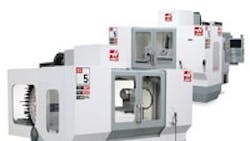When it comes to milling and turning equipment, place more emphasis on strategies that work toward increasing flexibility and easing equipment setup, advises Bill Tandrow, director of mechanical engineering, Haas Automation Inc., Oxnard, Calif. Above all, be mindful that success with the production equipment of the future will depend on a strategy of ongoing preparation, he adds.
Tandrow derives those assertions from observing the best practices of job shops, the core customer group of Haas Automation. A Haas competitor ties those practices to success: "In August, machine shops demonstrated record growth and their delinquency on machine tool leases reached an all-time low," reports Swiss-based Agie Charmilles.
The challenge for Haas is to evolve product development strategies to continue helping job shops build success. At stake is the customer loyalty of what Tandrow claims to be the largest number of machine tool consumers.
Tandrow says job shops requirements start with design fundamentals (flexibility and ease of setups) that reflect the work demands of their business model. "In addition job shops desire to have all the information technology and automation of information that the Internet has made available," he observes.
The other concerns for production equipment of the future have to do with such things as chip management issues.
Size issues will continue to be important considerations for tomorrow's machines. "One shop may use a large machine with multiple setups but only run part of the machine at a time," he points out. "Or the consideration may simply be the need for a machine footprint that fits the operating space."
Also coming is a greater exploitation of smart machine concepts, he adds. He anticipates a machine's growing degree of self-awareness to facilitate production goals. "For example, in the future, machines will routinely store job information to facilitate performance assessment." He credits the providers of shop scheduling software for having increased the general awareness of how significant machine information can be for business process decisions. As data availability gets better, a business gains success through better decisions. That will be a motivating factor in designing the production equipment of the future, he predicts.
Tandrow says the competitive prowess of a manufacturer is increasingly dependent on how information technology is integrated with the production equipment. In fact, he sees an unresolved IT/production equipment challenge. "If you're a small company, the burden of IT might overwhelm any benefit. So you may choose not to go down that path. On the other hand, a large organization may depend on IT." What's critical here is management's approach to the integration of IT and production equipment. He sees small organizations gaining more cost-effective entrees with IT.
"Manufacturing managements must understand and appreciate that if they're running production equipment it is critical to track and take advantage of developments in IT," Tandrow cautions. "Maybe big and expensive and sophisticated isn't as important as the right size, flexible, easy to integrate and more importantly, easy to evolve with."
See Also
